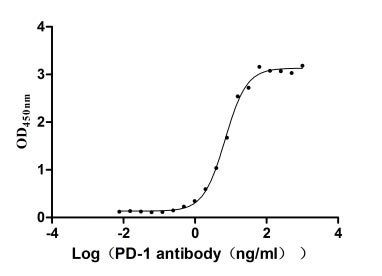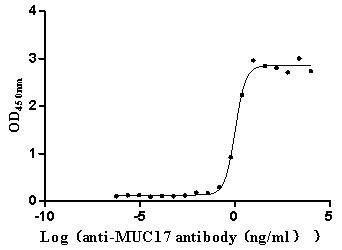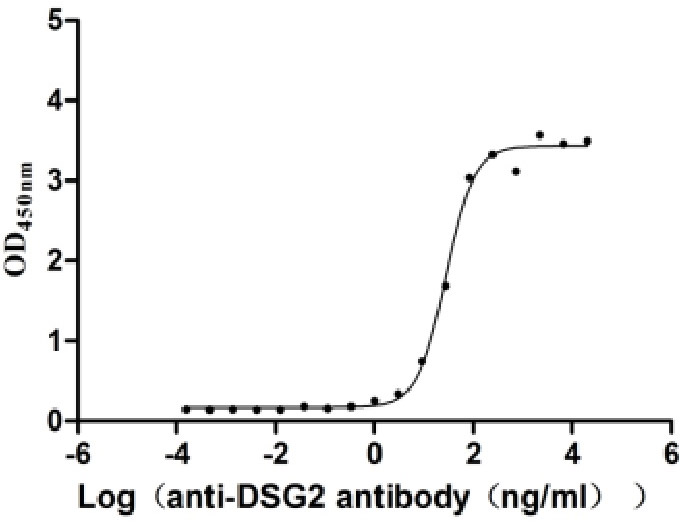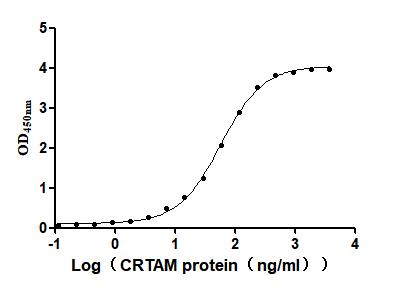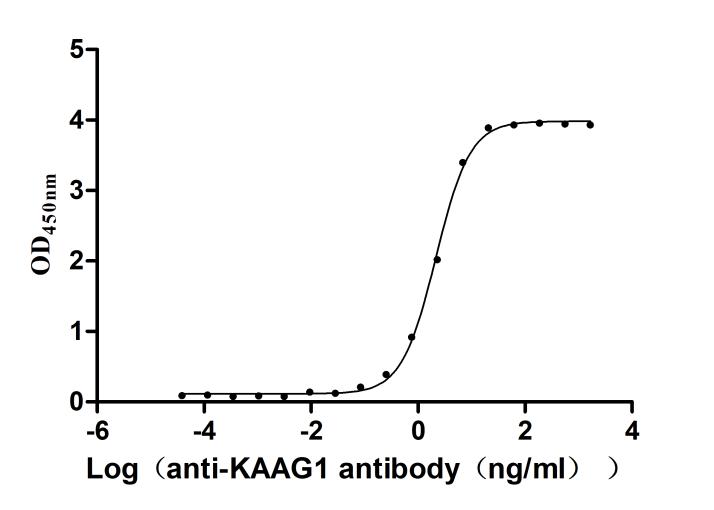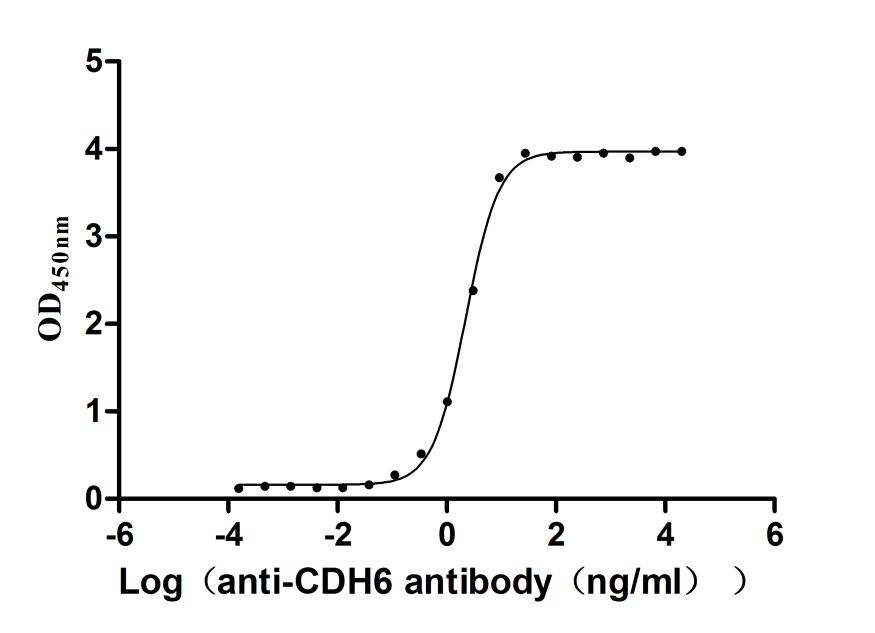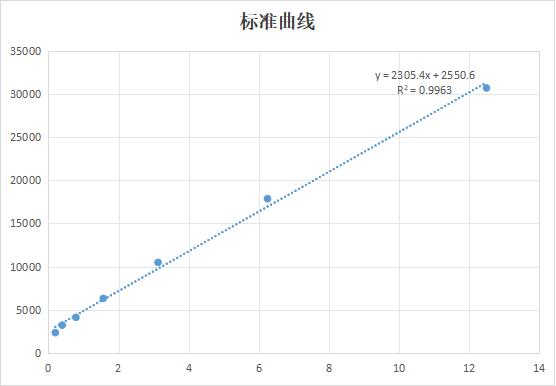Recombinant Human Gap junction beta-6 protein (GJB6), partial
-
货号:CSB-YP009456HU1
-
规格:
-
来源:Yeast
-
其他:
-
货号:CSB-EP009456HU1
-
规格:
-
来源:E.coli
-
其他:
-
货号:CSB-EP009456HU1-B
-
规格:
-
来源:E.coli
-
共轭:Avi-tag Biotinylated
E. coli biotin ligase (BirA) is highly specific in covalently attaching biotin to the 15 amino acid AviTag peptide. This recombinant protein was biotinylated in vivo by AviTag-BirA technology, which method is BriA catalyzes amide linkage between the biotin and the specific lysine of the AviTag.
-
其他:
-
货号:CSB-BP009456HU1
-
规格:
-
来源:Baculovirus
-
其他:
-
货号:CSB-MP009456HU1
-
规格:
-
来源:Mammalian cell
-
其他:
产品详情
-
纯度:>85% (SDS-PAGE)
-
基因名:GJB6
-
Uniprot No.:
-
别名:GJB6; Gap junction beta-6 protein; Connexin-30; Cx30
-
种属:Homo sapiens (Human)
-
蛋白长度:Partial
-
蛋白标签:Tag type will be determined during the manufacturing process.
The tag type will be determined during production process. If you have specified tag type, please tell us and we will develop the specified tag preferentially. -
产品提供形式:Lyophilized powder
Note: We will preferentially ship the format that we have in stock, however, if you have any special requirement for the format, please remark your requirement when placing the order, we will prepare according to your demand. -
复溶:We recommend that this vial be briefly centrifuged prior to opening to bring the contents to the bottom. Please reconstitute protein in deionized sterile water to a concentration of 0.1-1.0 mg/mL.We recommend to add 5-50% of glycerol (final concentration) and aliquot for long-term storage at -20℃/-80℃. Our default final concentration of glycerol is 50%. Customers could use it as reference.
-
储存条件:Store at -20°C/-80°C upon receipt, aliquoting is necessary for mutiple use. Avoid repeated freeze-thaw cycles.
-
保质期:The shelf life is related to many factors, storage state, buffer ingredients, storage temperature and the stability of the protein itself.
Generally, the shelf life of liquid form is 6 months at -20°C/-80°C. The shelf life of lyophilized form is 12 months at -20°C/-80°C. -
货期:Delivery time may differ from different purchasing way or location, please kindly consult your local distributors for specific delivery time.Note: All of our proteins are default shipped with normal blue ice packs, if you request to ship with dry ice, please communicate with us in advance and extra fees will be charged.
-
注意事项:Repeated freezing and thawing is not recommended. Store working aliquots at 4°C for up to one week.
-
Datasheet :Please contact us to get it.
相关产品
靶点详情
-
功能:One gap junction consists of a cluster of closely packed pairs of transmembrane channels, the connexons, through which materials of low MW diffuse from one cell to a neighboring cell.
-
基因功能参考文献:
- results showed the A88V and G11R mutants of GJB6 may activate the downstream execution factor, caspase-3, through the extrinsic apoptotic pathway mediated by caspase-8 and the intrinsic apoptotic pathway mediated by caspase-9; study provides further clarification on mechanisms underlying the effect of mutant variants A88V and G11R of the GJB6 gene on the induction of HaCaT cell apoptosis PMID: 30043857
- Investigation of stemness-related CD133 and cMyc in human samples and rat xenografts exhibited a reciprocal relationship between Cx30 and IGF-1R in the low and high grades (HG) of glioma. Cx30 was completely abolished in HG; levels of IGF-1R, CD133 and cMyc expression were positively correlated with HG. Cx30 transfection could attenuate the malignant burden of glioma in rat xenografts. PMID: 28875331
- Genotype may affect deafness severity, but environmental and other genetic factors may also modulate the severity and evolution of GJB2-GJB6 deafness. PMID: 29106882
- data reveals that a recurrent mutation p.A88V in GJB6 played a pathogenic role in a large Chinese family and emphasizes the importance of gene test in this congenital disorder PMID: 27137747
- Cx26 and Cx30 proteins thus seem not to be co-expressed but to form closely associated assemblies of gap junction plaques. PMID: 26941236
- del(GJB6-D13S1854) was highly prevalent in this sample of deaf Syrian families. PMID: 28012540
- identification and functional characterization of a new Cx30 mutation in a family with hearing impairment in association with previously unreported skin anomalies PMID: 26620415
- Screening of GJB6 gene large deletions among Syrians with congenital hearing impairment. PMID: 25989237
- results suggest that SNPs present in the GJB2 and GJB6 genes may have an influence on ARNSHL in humans. PMID: 26075227
- found that connexin 26 (Cx26) and Cx30 GJs readily diffuse within the plaque structures, whereas Cx43 GJs remain persistently immobile for more than 2 min after bleaching PMID: 26265468
- GJB6 deletions were not detected. PMID: 25288386
- An absence of GJB6 mutations and low frequency of SLC26A4 mutations suggest that additional genetic factors may contribute to nonsyndromic hearing loss in India. PMID: 26188157
- Results show high mRNA and protein levels for Cx43 and Cx30 in breast cancer but they are correlated with improved and bad outcome respectively suggesting that they may serve as prognostic markers in breast cancer. PMID: 25383624
- Mutations in GJB2, GJB6 and GJA1 are not a major cause of non-syndromic deafness in black Africans PMID: 26046157
- study found A c.31G>A (p.G11R) missense mutation in GJB6 gene is the genotypic characteristic for hidrotic ectodermal dysplasia in Chinese population PMID: 23981984
- A new extended deletion in the GJB2 and GJB6 gene sequences (approximately 101 kb in size; NC_000013.10:g.20,757,021_20,858,394del), detected in three unrelated Russian patients, was described and characterized. PMID: 25715449
- Mutations in GJB6 and GJA1 are not a major cause of nonsyndromic deafness in this group of Africans from Cameroon and South Africa. there is no sufficient evidence to support their testing in a clinical setting for individuals of African ancestry. PMID: 24785695
- We found a great variety of mutations depending on the analyzed region in patients with SNHL; 57.86% of patients had affection in one or two alleles in GJB2 or GJB6 genes whereas 42.14% were wild-type. In some cases, allele distribution depended on region PMID: 24774219
- In a cohort of Slovakian cochlear implant users, GJB6 deletion delD13S1830 was identified in only one subject of 131, in double heterozygosity with a GJB6 mutation. PMID: 23700267
- In a cohort of patients with mild to profound autosomal recessive sensorineural hypoacusis, 1% exhibited compound heterozygosis for GJB6-D13S1830 deletion and 35delG/GJB2. PMID: 23553242
- None of the most common types of deletions in the GJB2 gene (c.35delG, c.167delT or c.235delC) were found in this large cohort of deaf children from Uganda PMID: 24706568
- GJB2 mutation is not a significant gene in patients diagnosed with hearing loss in subsaharan Africa. PMID: 21392827
- increased expression in Dupuytren's disease PMID: 24359029
- Significant heterogeneity was observed in the alleles and patterns of NSHI inheritance among the subjects studied PMID: 23684175
- Clouston syndrome with heterozygous GJB6 mutation p.Ala88Val and GJB2 variant p.Val27Ile revealing mild sensorineural hearing loss and photophobia in 24 year old Japanese female PMID: 23863883
- these results showed thatc.35delG is the most common but not the only GJB2 mutation and that the del(GJB6-del D13S1830) is absent in our cohort. PMID: 23434199
- We identified a recurrent heterozygous mutation c.31G>C (p.Gly11Arg) in the GJB6 gene in the Lebanese-German family with Clouston syndrome. PMID: 23219093
- In this work, the screening of 77 patients did not reveal the delGJB6-D13S1830 mutation and our results cannot suggest risk of hearing impairment due to this mutation in our population. PMID: 23503914
- the 35delG mutation was detected in 12 (12.7 per cent): 10 (83.3 per cent) were homozygous and 2 (16.7 per cent) heterozygous mutant. The 167delT and del(GJB6-D13S1830) mutations were not detected. PMID: 23171692
- Genetic analyses of the GJB2 and GJB6 genes indicated that similar pathological genotypes, occurring with similar frequencies, may be responsible for both progressive and non-progressive hearing loss. PMID: 22704424
- GJB3 and GJB6 genetic variants are associated with the pathogenicity of nonsyndromic sensorineural hearing loss. PMID: 22617145
- Twenty subjects (59%) had a family history of HL, with 26% specifically reporting familial unilateral HL. Mutational screening revealed sequence variants in the GJB2, GJB3, TECTA, and COCH genes. Two novel mutations were detected in COCH and TECTA. PMID: 22534022
- in Cx30, positively charged Glu49 residues establish a potential barrier within the fully open channel PMID: 22292956
- GJB6 del(GJB6-D13S1830) mutation was not detected in any of Non-syndromic hearing loss samples PMID: 22281373
- Study found no mutations in GJB6 or POU3F4 in nonsyndromic Tibetan Chinese patients with hearing impairment. PMID: 22389666
- GJB6 deletion and A1555G mutation account for a minor proportion of nonsyndromic sensorineural hearing loss in the Qatari population PMID: 22103400
- GJB6 mutations is not a common cause of sensorineural hearing loss among chinese population. PMID: 22186156
- A neonatal hearing screening program in Campania, Italy did not find any incidence of GJB6 or GJB3 mutations. PMID: 21916817
- study concludes the hearing loss in probands with the del(GJB6-D13S1854) deletion (and a heterozygous mutation in GJB2) results from a lack of functional Cx26 protein; results are supportive of presence of GJB2 cis-regulatory element(s) upstream GJB6 PMID: 21738759
- All students with association GJB2 mutation and GJB6 showed severe to profound hearing loss in both ears. PMID: 22106692
- The p.A40V mutation in CX30 causes autosomal-dominant nonsyndromic hearing loss. PMID: 21731760
- mutations in the GJB6 gene are unlikely to be a major cause of non-syndromic deafness in Asian Indians PMID: 21227513
- Some GJB2, GJB3, and GJB6 mutations occurred in deaf students. PMID: 18338563
- Heterozygote mutation carriers had less hearing impairment, but most other factors demonstrated no differences. These results support the theory of an unidentified genetic factor contributing to hearing loss in some heterozygote carriers. PMID: 21287563
- analysis of GJB2 and GJB6 mutations in Southeastern Brazilians with hereditary nonsyndromic deafness PMID: 20563649
- Mutation of GJB6 gene is infrequent in the Chinese non-syndromic hearing-loss population. PMID: 17438853
- The frequency of 35delG/GJB2 and del (D13S1830/GJB6) alleles in patients with-non-syndromic deafness was 7.8% and 0.65%, respectively. PMID: 20835527
- The generation and characterization of a mouse model for human bilateral middle/high-frequency hearing loss based on the substitution of an evolutionarily conserved threonine by a methionine at position 5 near the N-terminus of Cx30, is described. PMID: 20858605
- These results indicate that the expression of connexin 30 is a novel differentiation marker mediating the biological behavior of intestinal phenotype gastric cancer. PMID: 21116114
- GJB6-associated deafness was correlated with better oral outcomes in Portuguese cochlear implant users PMID: 20650534
显示更多
收起更多
-
相关疾病:Ectodermal dysplasia 2, Clouston type (ECTD2); Deafness, autosomal recessive, 1B (DFNB1B); Deafness, autosomal dominant, 3B (DFNA3B)
-
亚细胞定位:Cell membrane; Multi-pass membrane protein. Cell junction, gap junction.
-
蛋白家族:Connexin family, Beta-type (group I) subfamily
-
数据库链接:
HGNC: 4288
OMIM: 129500
KEGG: hsa:10804
STRING: 9606.ENSP00000241124
UniGene: Hs.511757
Most popular with customers
-
Recombinant Human Programmed cell death protein 1 (PDCD1), partial (Active)
Express system: Mammalian cell
Species: Homo sapiens (Human)
-
Recombinant Human Zymogen granule protein 16 homolog B (ZG16B) (Active)
Express system: Mammalian cell
Species: Homo sapiens (Human)
-
Recombinant Human Mucin-17 (MUC17), partial (Active)
Express system: Mammalian cell
Species: Homo sapiens (Human)
-
Recombinant Human Desmoglein-2 (DSG2), partial (Active)
Express system: Mammalian cell
Species: Homo sapiens (Human)
-
Recombinant Mouse Cytotoxic and regulatory T-cell molecule (Crtam), partial (Active)
Express system: Mammalian cell
Species: Mus musculus (Mouse)
-
Recombinant Human Kidney-associated antigen 1(KAAG1) (Active)
Express system: E.coli
Species: Homo sapiens (Human)
-
Recombinant Macaca fascicularis Cadherin 6(CDH6),partial (Active)
Express system: Mammalian cell
Species: Macaca fascicularis (Crab-eating macaque) (Cynomolgus monkey)
-
Recombinant Human Urokinase-type plasminogen activator(PLAU) (Active)
Express system: Mammalian cell
Species: Homo sapiens (Human)


